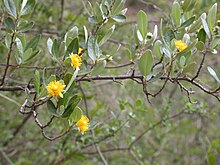| Pineda | |
|---|---|

| |
| Pineda incana | |
| Scientific classification | |
| Kingdom: | Plantae |
| Clade: | Tracheophytes |
| Clade: | Angiosperms |
| Clade: | Eudicots |
| Clade: | Rosids |
| Order: | Malpighiales |
| Family: | Salicaceae |
| Subfamily: | Salicoideae |
| Tribe: | Prockieae |
| Genus: | Pineda Ruiz & Pav. |
| Type species | |
| Pineda incana Ruiz & Pav. | |
| Species | |
| Synonyms | |
| |
Pineda is a genus of flowering plants in the family Salicaceae. It contains two species of shrubs: Pineda incana, which is native to the Andes of Ecuador and Peru, and Pineda ovata, which is native to the Andes of Bolivia.
Pineda is unique among Salicaceae in that the species have 4-5 sepals and petals, hermaphroditic flowers, receptacular disk glands (=nectaries), and outer filamentous staminodes. It is one of few genera of Salicaceae that occur at high elevations. Formerly placed in the heterogeneous family Flacourtiaceae, Pineda is now classified in tribe Prockieae of Salicaceae, along with close relatives Prockia, Banara, Hasseltiopsis, and Neosprucea.
Pineda was named in honor of Antonio Pineda, a Guatemalan botanist who was coordinator of the naturalists aboard the Pacific expedition of Alessandro Malaspina.
Pineda incana is known as "lloqui," "lloque," "lloquecillos," or "manzanitas cimarronas," and Pineda ovata is known as "duraznillo." Pineda ovata is commonly misidentified as Prockia crucis (Salicaceae).
References
- ^ Alford, M.H. 2006. A taxonomic revision of the Andean genus Pineda (Salicaceae). Kew Bulletin 61: 205-214.
- Sleumer, H.O. 1980. Flacourtiaceae. Flora Neotropica 22: 1-499.
- Ruiz, H. and J. Pavón. 1794. Flora Peruvianae, et Chilensis Prodromus. Madrid, Spain.
![]() Data related to Pineda at Wikispecies
Data related to Pineda at Wikispecies
| Taxon identifiers | |
|---|---|
| Pineda | |
This Salicaceae article is a stub. You can help Misplaced Pages by expanding it. |